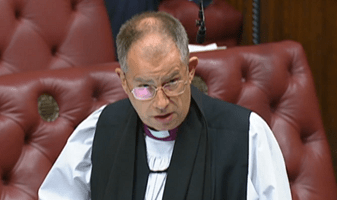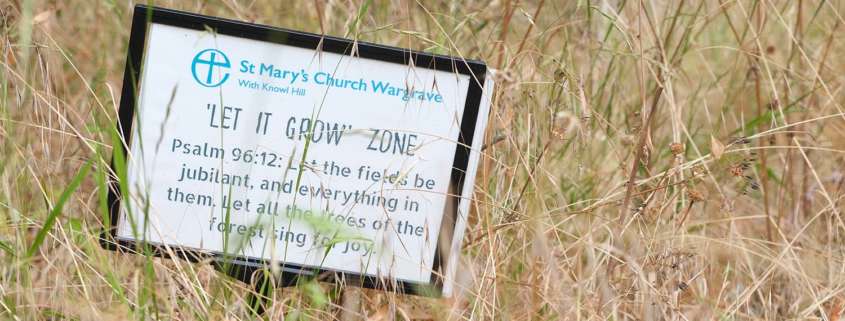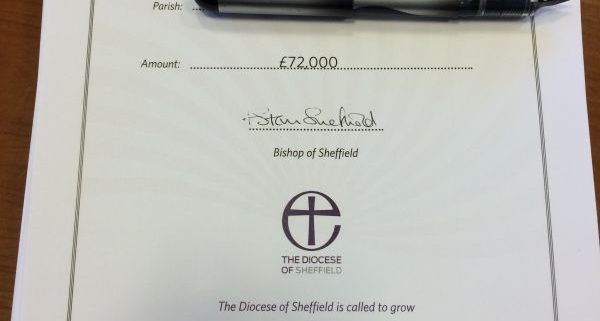In early June, 2015 I was invited to give an address to the Deutscher Evangelischer Kirchentag in Stuttgart. The address was part of a workshop stream exploring Fresh Expressions of Church. There is a growing interest in the German Church in new forms of church for a changing culture and many in Germany are keen to learn lessons from the experience of the Church of England.
1. A story from Acts
It is an honour to take part in the Kirchentag and thank you for your welcome. It is good to be with you both to teach and to learn today. I pray that all of us may gain a wiser heart in every way as a result of this conference.
There is a key moment in the Acts of the Apostles I would like to share with you. It occurs in Acts 11 and arises from a time of great difficulty, a period of persecution which followed the martyrdom of Stephen.
“Now those who were scattered because of the persecution….travelled as far as Phoenicia, Cyprus and Antioch and they spoke the word to no-one except Jews. But among them were some men of Cyprus and Cyrene who, on coming to Antioch, spoke to the Hellenists also, proclaiming the Lord Jesus. The hand of the Lord was with them and a great number became believers and turned to the Lord.”
We are reading here of a spontaneous movement of mission, inspired by the Spirit.
“News of this came to the ears of the church in Jerusalem….” I wonder if you can imagine yourself present at that meeting as the apostles debate this development. They ask the question: “Whom shall we send to explore what is happening?” They looked round the room and, in a moment of inspiration, they chose to send Barnabas, the son of encouragement.
“…..and they sent Barnabas to Antioch. When he came and saw the grace of God, he rejoiced and he exhorted them all to remain faithful to the Lord with steadfast devotion; for he was a good man, full of the Holy Spirit and of faith.”
Barnabas is here exercising discernment – seeing that what is happening is of God. Goodness, the Holy Spirit and faith are needed. These are rare qualities among those called to senior church leadership (according to Acts). Luke singles Barnabas out as exceptional even among the apostles.
“Then Barnabas went to Tarsus and looked for Saul and when he had found him he brought him to Antioch. So it was that for an entire year they associated with…..” With what? What do you think is the next word in the text?
“…with the Church” – ecclesia with the definite article. Ponder for a moment what that means. A new church has been created by the Word and by the Spirit and has been discerned, recognized and connected to the rest of the Body of Christ.
“…they associated with the Church and taught a great many people and it was in Antioch that the disciples were first called “Christians”” (Acts 11.19-29).
2. What has happened in the Church of England?
Please hold that story in your mind as we explore together some of the lessons derived from the experience of the Church of England.
Through most of the twentieth century, the predominant culture in England has been a secularizing culture. The reasons for that are complex and will be familiar. But, if anything, secularization was as rapid in England as in much of Northern Europe. Overall, the Church in England remains in significant decline.
As the water table of faith dropped in the population at large, the Church of England set itself to become a missionary church once again. For three generations we have been a church emerging from Christendom into a different kind of community. To be an emerging church has meant relearning many lessons from the past: about mission and evangelism and catechesis as core disciplines.
In the 1990’s we began to learn new lessons about forming new ecclesial communities through contextual mission. At first our learning was informal and accidental, the gathering of fragments of stories as different pioneers were inspired to go to parts of the community which knew nothing of Christ not to draw people back to the existing church but to create new churches.
That gathering of stories led to an attempt to understand what was happening and to develop a vocabulary to describe it. We called the new ecclesial communities “fresh expressions of church”. As a Church we took a decision in 2004 actively to support the formation of new communities through contextual mission and to encourage a mixed economy of church for the new millennium. Our mission context calls us to be more diverse. We have encouraged the formation of fresh expressions in every diocese; we have identified a recognized focus of training for ordained ministry called ordained pioneer ministry; we have rolled out a training programme for lay pioneers and clergy; we have seen this movement expand internationally and ecumenically, for which thanks to be to God. We have seen the movement challenged theologically and those challenges refuted[1].
Over the last 12 years this movement has grown and multiplied and has been resourced in different ways and different places. There are now thousands of fresh expressions of church across every part of the Church of England. 10 dioceses (out of 42) were surveyed for a major study published in 2014. In those dioceses:
- Fresh expressions account for 15% of churches and 10% of attendance
- In 7/10 dioceses growth of fresh expressions cancels out decline
- In terms of numbers, these fresh expressions add a further diocese to the Church of England
- 52% of fresh expressions are lay led
- Most are small and growing and part of an existing parish
In the words of the report, “Nothing else in the Church of England has this level of missional impact and adding further ecclesial communities”[2]
I was for five years from 2004 to 2009 the first Team Leader of the national ecumenical fresh expressions team. Since 2009, I have been Bishop of Sheffield and also since 2012 the Chair of the Ministry Council of the Church of England overseeing all selection and training for ministry. From that perspective, I would like to offer you 9 short lessons for a church which wants to move in this direction. The first three are grouped around mission, the second around ecclesiology, the third around encouragement and the ways it is given.
3. What lessons have we learned about mission?
i. Mission is God’s Mission
This whole movement is undergirded, supported, held by a theological understanding of the mission of God: that God is a God of mission; that mission is the outworking of God’s love and God’s very nature; that God is deeply and profoundly at work in the whole world; that God is working already outside the Church; that mission is centred on discovering what God is already doing and joining in; that God is concerned most with those who are furthest from God’s love and light; that mission follows the pattern of Christ in both his incarnation and his character; that mission is about being sent by Christ in the power of the Spirit; that mission is about proclaiming the kingdom, teaching and baptizing new believers, service to the wider community; seeking to transform unjust structures, care for God’s earth and working for reconciliation.
This theological understanding of God’s mission has been rebirthed in the Church of England over several generations, inspired by the Anglican Communion, by theologians returning from mission elsewhere in the world, by the worldwide renewal of a theological understanding of mission, by discernment arising from study of the scriptures at the core of the Anglican tradition.
The changes we have experienced have arisen from this theological renewal. They are not simply about pragmatism or what is effective; still less about what is fashionable for its own sake. Much of the theological wrestling we have done are the core theological questions of mission – especially contextualization. Do not attempt to encourage fresh expressions of Church without this serious theological undergirding.
ii. The whole Church and every church needs to be mission-shaped
Once that work is done it is possible to see instantly that we are not talking about fresh expressions of church which do mission and parish churches which do not. We are talking about every church engaging in God’s mission, whatever that means. In developing fresh expressions we are not talking about questions of personal preference or taste, what some have characterized as boutique church – but about what is helpful and effective and essential for those who are coming to faith and growing in faith.
This is the vision statement of the Diocese of Sheffield which undergirds all we do in the Diocese and the reshaping of every parish church, every deanery, every fresh expression and every appointment:
“The Diocese of Sheffield is called to grow a diverse network of Christ-like, lively and diverse Christian communities in every place which are effective in making disciples and in seeking to transform our society and God’s world”
iii The whole Church needs to invest in evangelism
To be fit for purpose every Church needs to invest in evangelism: communicating the good news to men, women and children. Local churches which do invest in evangelism will grow, whether they are fresh expressions or not. Local churches which do not invest in evangelism will not grow, whether they are fresh expressions or not.
Evangelism is a complex series of disciplines, often subject to caricature. I was asked to be the Anglican Fraternal Delegate to the Roman Catholic Synod of Bishops on Evangelisation in Rome in 2013. In a paper for the General Synod in 2014, I attempted to describe 7 Disciplines of Evangelisation all of which need intentional investment and development across the local Church, by Dioceses and by the Church nationally. The 7 disciplines are:
- Prayerful discernment and listening (contemplation)
- Apologetics (defending and commending the faith)
- Evangelism (initial proclamation)
- Catechesis (learning and teaching the faith)
- Ecclesial formation (growing the community of the church)
- Planting and forming new ecclesial communities (fresh expressions of the church)
- Incarnational mission (following the pattern of Jesus)[3]
As part of that investment in evangelism, the House of Bishops have developed Pilgrim to encourage catechesis across the Church of England, in all kinds of expressions of church[4].
4. What lessons have we learned about ecclesiology?
iv. We need to think and talk about the Church
Developing new forms of church shifts ecclesiology to the centre of the theological agenda. We need to reflect over and over again on what it means to be the church in different ways and different places. Our experience was that our ecclesiological muscles were flabby and underdeveloped. We had left ecclesiology to ecumenists. It needs to become once again the province of missiologists. The forms for Church need to be shaped by the mission of God. Our understanding of the mission of God needs to be shaped by Christ and by our Christology.
The best resources here are short summaries of what is essential about the Church not long, dense studies. What are the essential marks of the Church? What does something have to be or to have before it can be called the Church?
v. We need language to describe different forms of church working together
It is vital to develop a both-and approach to parish churches and to fresh expressions. We must never set them in competition. Each must use respectful language when speaking about the other.
The biggest challenge to the fresh expressions movement in the UK has come from not using language carefully. Where fresh expressions have communicated that they are not a new thing to sit alongside the old but the new thing to supplant the old there has been resistance to change and a turning back to old ways. The language which has worked best for us has been the language of mixed economy of church or mixed ecology of church. Both forms of church are missional, both need each other, both serve different purposes in an increasingly diverse society and mission field.
vi We need to enable and encourage fresh expressions of church
Within the context of the mixed economy, fresh expressions need positive encouragement and endorsement by senior church leaders and by the wider church if they are to flourish. These are tender, delicate plants. We have moved as a church in twenty years from hostility and suspicion, to tolerance, to permission giving, to active blessing, and in some cases to resourcing and integration of the new with the old. This has not always been an easy journey. It has not been the same journey in every diocese. Some are very much ahead of the others. But the greater the encouragement, the greater the fruit.
5. What lessons have we learned about encouragement?
Finally and briefly what lessons have we learned about how to encourage fresh expressions of church within a mixed economy. How can we be Barnabas in this contemporary Antioch?
vii. Encourage fresh expressions as you do fresh expressions
We have learned to encourage fresh expressions in the same way as we do fresh expressions. We have learned to be light touch, responsive to what God is doing, courageous and risk taking, listening and finding out what works.
It was tempting in the beginning to set out a great denominational structure, a programme of activity, a demanding syllabus, great files of policy. Wherever we developed them, they were like David trying on the armour of Saul. What was needed was blessing, simplicity, eyes open, listening ears, time, prayer, an openness to the Holy Spirit.
This movement is of God and is still in its infancy. We need to be sensitive, flexible, humble and discern what God is doing. We are not rolling out a programme.
viii. A principled and careful loosening of the structures
The best policy we have developed has been about removing obstacles rather than creating templates or strategies. Rowan Williams, the last Archbishop of Canterbury, did a huge amount to encourage fresh expressions. One of his many helpful phrases was a call for this principled and careful loosening of structures to give the new ecclesial communities space and time to grow. We need possibility and creativity more than we need regulation and adversity to risk.
ix. Relationships are vital
Finally and very briefly, relationships are vital and particularly relationships between denominational leaders and pioneers, the loyal radicals of the Church who want to see change but to remain part of the denomination. These relationships are vital in both directions. The pioneers need the denominational leaders to remain connected and also to provide support in brokering new opportunities. The denominational leaders need the loyal radicals so that we continue to be challenged and refreshed by the very edges of the life of the Church.
This is exactly what is happening when Barnabas goes to Antioch. The centre is going to meet the edge. The edge is meeting the centre. In the dialogue between the two there is creativity and life and the recognition of a new form of church.
[1] For a developed account of this see “Fresh Expressions in the Mission of the Church”, Report of an Anglican Methodist Working Party, Church House Publishing, 2012




